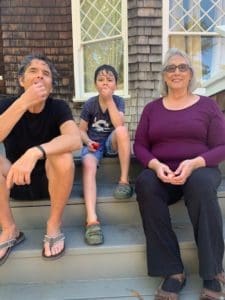
By Diana Lopez, Commissioner on Aging
A Bit of History
On July 30, 1965, President Lyndon B. Johnson signed into law legislation that established the Medicare program. We celebrate this 55th anniversary of Medicare protecting the health and well-being of millions of Americans, saving lives, and improving the economic security of our nation.
President Teddy Roosevelt included a plan for national health insurance in his platform when he ran for president in 1912.
In November of 1945, President Harry Truman asked Congress to create a national health insurance fund. He proposed a plan that would provide health coverage to individuals that paid for doctor visits, hospital care, laboratory services, dental care and nursing services, but he could not get a bill passed.
Twenty years later, President Lyndon B. Johnson signed legislation that created Medicare – a national insurance plan for people 65 and over.
In 1972, Medicare coverage was expanded to include people with long-term disabilities and end-stage renal disease and subsequently coverage was added for home health and hospice services as well as for people with amyotrophic lateral sclerosis.
Medicare began contracting with private plans (Medicare Advantage Plans) in the 1990s.
The Improvement and Modernization Act of 2003 added a prescription benefit: Medicare Part D.
The Patient Protection and Affordable Care Act of 2010 added provisions that contain Medicare costs, increase revenue, improve delivery systems, and increase services.
Medicare
Medicare is a National Health Insurance program that covers pre-existing conditions and is not based on income. Medicare Part A, which covers hospital services is funded by payroll taxes, cannot really ‘go broke’. Medicare Part B (which covers doctors’, laboratory, and radiology services, among others) is funded by premiums, federal and state revenue, and interest on its investments.
Medicare accounts for 20 cents of every dollar spent on health care, 30 cents of every dollar spent on prescriptions, and 25 percent of hospital spending.
Medicare also pays for graduate medical education for interns and residents at rural and teaching hospitals.
There are currently 67.7 million people receiving health coverage through Medicare. Medicare covers 9.1 million people with disabilities who are under age 65. And over 24 million people receive their care from Medicare Advantage plans.
Medicare spending will reach $858.5 billion in 2020.
Medicare and COVID-19
Medicare covers the cost of lab, FDA-authorized antibody tests, and hospitalizations for COVID-19.
At this time, there is no vaccine for COVID-19, however, it will be covered when one becomes available.
Medicare Advantage Plans offer the same benefits. Many Medicare Advantage Plans offer additional benefits such as telehealth, meal delivery, and transportation services.
Be aware that scammers are using the COVID-19 pandemic to take advantage of people. Please remember that Medicare will never call you to ask you your Medicare number!
People’s Voices
Medicare is a bright spot in America’s healthcare system. As we recognize 55 years of Medicare, let’s end with a few quotes from people who receive health care through Medicare:
- “Medicare covered all the medical bills when my husband fought pancreatic cancer. We could never have afforded the medicines and medical care he required. Thank God for Medicare.”
- “I had no medical insurance until I turned 65 and became eligible for Medicare. Since then I have had several expensive medical problems, plus chronic glaucoma. Without Medicare, I don’t know how I would have been able to get the care I needed.”
- “I will be on the streets at 66 years old without Medicare. It’s as simple as that! My money has all gone raising 3 granddaughters after their mother died. There are millions of stories like mine everywhere. We must help the least of us that had bad luck or are sick.”
- “Without Medicare, we would have probably spent our life’s savings, lost our house and become among the elderly poor needing public benefits for food and shelter. Medicare has made it possible for us to maintain our independence and our way of life into our retirement years. Thank you!”

